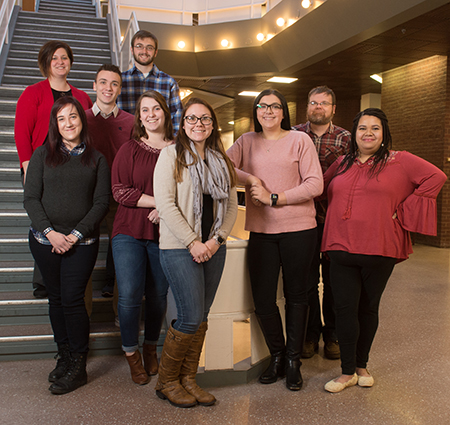 At Southern Illinois University Edwardsville, hands-on learning, interdisciplinary collaboration, faculty scholarship and student research opportunities are high priorities in the preparation of students who will shape a changing world.
At Southern Illinois University Edwardsville, hands-on learning, interdisciplinary collaboration, faculty scholarship and student research opportunities are high priorities in the preparation of students who will shape a changing world.
A research project led by Sarah Conoyer, PhD, assistant professor in the School of Education, Health and Human Behavior’s Department of Psychology, is hitting all of those marks, and when complete will positively impact teacher assessment of students with learning disabilities.
“We’re developing a technology-based formative assessment system for monitoring the science language acquisition of students with learning disabilities,” Conoyer explained. “Students who struggle with word knowledge may have a hard time engaging with science content and activities. This can hinder their learning and interest in science and potentially impact their access to STEM education and related careers.
“The Progress Assessment of Science and Academic Language (PASCAL) System we’re creating will provide teachers with regular feedback on their students’ performance in foundational science concept terminology and vocabulary,” she added.
The idea for the assessment tool was developed through Conoyer’s collaboration with Nathan Clemens, PhD at The University of Texas.
Several SIUE students are contributing to the project, with expected completion of initial software targeted for April. Additionally, Mark McKenney, PhD, associate professor of computer science, is a project consultant.
“As an SIUE alumna, involving undergraduate students in my research is a top priority, since I know firsthand how conducting research can make a high impact on student engagement in their area of study and future career,” Conoyer said. “This project has allowed me to implement the teacher-scholar model by sharing current research about formative assessment in my field to advance the knowledge and skills of my students.”
A team of three computer science students are working with Conoyer as their senior assignment under the supervision of Gary Mayer, PhD, assistant professor of computer science. Bradley Peradotto, of Pinckneyville, Tyler Simpson, of St. Louis, and Brendan Shelton, of Edwardsville, have assisted in software creation, including determining which tools, programming languages and platforms would be best for the project and developing the software.
“This project builds upon everything I have learned as a computer science major, and allows me to apply it to a real project,” Peradotto said. “Building a piece of software from the ground up is not easy and requires a strong plan for successful completion. Having a project or piece of software to show potential employers definitely improves your chances of being hired. When I graduate in May and go on to get a job as a software developer, I’ll be part of a team that will be applying the same skillset as I am for this project.”
Fellow undergraduates in psychology are working to develop science terms and definitions related to students’ grade level and the Next Generation Science Standards. Contributors include Shelbi Simmons, of Granite City, and Undergraduate Research and Creative Activities (URCA) assistants Jennifer Robbins, of Bunker Hill, Gabrielle Ellis, of Hazelwood, Mo., Nicole Ties, of Elizabeth, and DeAnna Scully, of Belleville.
“Ultimately, this tool will help children succeed in their academic work,” Robbins said. “As an aspiring school psychologist, I’m excited about how PASCAL will benefit students who are struggling with science vocabulary.”
“I’m working on gathering and entering earth science and engineering vocabulary for seventh grade,” added Ellis, who is double majoring in psychology and sociology. “Working in a lab is a great opportunity for any student who wishes to go to graduate school or wants to gain experience before entering the job market.”
Graduate student Rachel Romano is also involved. Having earned a master’s in clinical child and school psychology from SIUE in December, she is now pursuing a specialist degree in school psychology.
“Formative assessment and curriculum-based measures are important tools used by school psychologists to help monitor students’ learning, identify strengths and weaknesses and recognize when a student is struggling in a subject area,” Romano said. “I am gaining a better understanding of these tools and how they are created through my work in this research lab.”
According to Conoyer, her receipt of an SIUE STEP grant totaling $15,996 for FY19 will further advance her scholarship and teaching by supporting the continued design, development and implementation of the PASCAL system.
“I most look forward to engaging my students in the community through implementing this tool with K-12 students, teachers and parents, while building partnerships with school districts,” she said. “The STEP funding will also allow me to develop collaborative relationships with other resources on campus, such as the STEM Center, and cultivate this interdisciplinary project beyond our campus alongside Dr. Clemens.”
Photo: SIUE’s Dr. Sarah Conoyer (far left) stands with student researchers (L-R) Shelbi Simmons, Brenden Shelton, Tyler Simpson, Jennifer Robbins, DeAnna Scully, Nicole Ties, Bradley Peradotto and Gabrielle Ellis.